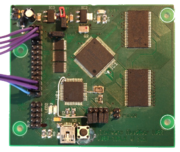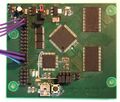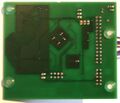Difference between revisions of "HSA Logic"
Jump to navigation
Jump to search
| Line 36: | Line 36: | ||
== Protocol == | == Protocol == | ||
For the sake of simplicity all commands and status messages have been implemented as simple ASCII tokens (single characters). | |||
=== Commands === | |||
{| class="wikitable" | |||
|- | |||
! Command !! Description | |||
|- | |||
| 'g' || = go, start sampling | |||
|- | |||
| 's' || = stop sampling | |||
|- | |||
| 'r' || = reset | |||
|- | |||
| 'd' || = dump data (binary) | |||
|- | |||
| 'D' || = dump data (ASCII encoded) | |||
|- | |||
| 'i' || = identify | |||
|- | |||
| 'S' || = get status | |||
|} | |||
=== Status messages === | |||
{| class="wikitable" | |||
|- | |||
! Command !! Description | |||
|- | |||
| 'r' || = measurement is running | |||
|- | |||
| 's' || = measurement stopped/ no measurement | |||
|- | |||
| 'f' || = memory is full | |||
|} | |||
=== Data format === | |||
The samples are blocks of 32 bit: 8 bit data, 16 bit timestamp, 8 bit status. These can be read via the dump command. | |||
The analyzer only stores new samples if any logic level changes. | |||
== Resources == | == Resources == | ||
Revision as of 20:25, 17 January 2014
 | |
| Status | in progress |
|---|---|
| Source code | hardware/hsa-tple |
| Channels | 8 (24 planned) |
| Samplerate | 6.25 MHz |
| Samplerate (state) | ? |
| Triggers | none (SW-only) |
| Min/max voltage | 3.3V; 5.0V |
| Threshold voltage | ? |
| Memory | 1 MB (245K*16), 262144 samples |
| Compression | RLE |
| Website | trac, project page, hhwiki |
The HSA Logic is a USB-based, 8-channel logic analyzer with 6.25 MHz sampling rate. It is an open-hardware / open-source design. Both hardware and software have been developed at Hochschule Augsburg so far. Everything started with this bachelor thesis in 2010. It was continued in 2013/14 as semester project.
Hardware
- CPLD: Altera Max II EPM240 with 240 logic elements
- microcontroller: Atmel ATmega32u4 (programmed in C)
- 2x RAM organised as 256K*16
- I/O drivers supporting 5V and 3V as input voltage
Photos
Firmware
CPLD Firmware: written in VHDL, microcontroller Firmware: written in C (using LUFA) TODO.
Protocol
For the sake of simplicity all commands and status messages have been implemented as simple ASCII tokens (single characters).
Commands
| Command | Description |
|---|---|
| 'g' | = go, start sampling |
| 's' | = stop sampling |
| 'r' | = reset |
| 'd' | = dump data (binary) |
| 'D' | = dump data (ASCII encoded) |
| 'i' | = identify |
| 'S' | = get status |
Status messages
| Command | Description |
|---|---|
| 'r' | = measurement is running |
| 's' | = measurement stopped/ no measurement |
| 'f' | = memory is full |
Data format
The samples are blocks of 32 bit: 8 bit data, 16 bit timestamp, 8 bit status. These can be read via the dump command. The analyzer only stores new samples if any logic level changes.
Resources
TODO.

